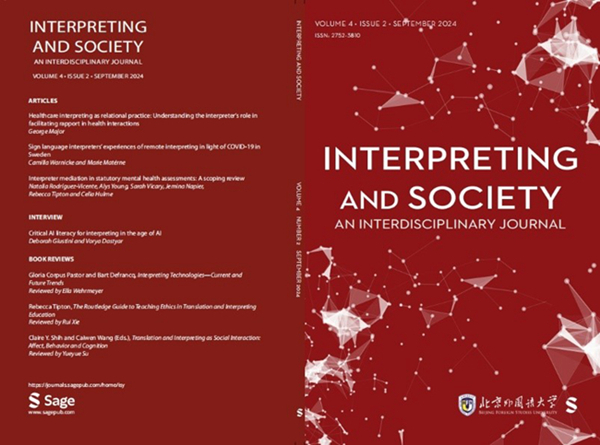- Research
- Research Centers
- Journals
- Admission
- Introduction
- Programs
- Application
- Alumni & Giving
- Alumni Club
- Giving
Interpreting and Society: An Interdisciplinary Journal, an English-language academic journal published by Beijing Foreign Studies University (BFSU), was recently indexed in Scopus.
This marks another major milestone for the journal since its launch in September 2021, following its inclusion in the AMI Comprehensive Evaluation Report of Chinese Journals of Humanities and Social Sciences and the DOAJ database, and reflects its growing international influence and recognition in the field of interpreting studies.

The cover of Interpreting and Society: An Interdisciplinary Journal [Photo/bfsu.edu.cn]
Interpreting and Society is a collaborative publication by BFSU and the global academic publisher Sage. A part of BFSU's multilingual journal portfolio, it is also the first English-language international journal dedicated to interpreting studies initiated by a Chinese university.
The journal primarily publishes cutting-edge research on interpretation, encompassing theoretical, practical and pedagogical perspectives, with a particular emphasis on interdisciplinary studies and the social attributes of interpreting activities. It accepts various types of contributions, including original research papers, book reviews and interviews.
To maintain its academic quality and global impact, Interpreting and Society follows a double-blind peer review process and operates as an Open Access journal, adhering to world-class standards. Its editorial office is based at BFSU’s Graduate School of Translation and Interpretation, with Ren Wen, dean of the school, and Wang Binhua, professor at the University of Leeds, serving as co-editors-in-chief. The journal’s editorial board comprises notable scholars and emerging academics in the field of interpreting from 20 universities worldwide.
In their evaluation, Scopus experts said that Interpreting and Society consistently publishes articles with high academic values that are closely related to the international academic forefront and professional readers in the field. The journal’s focused scope effectively meets the needs of a special readership.
Scopus, developed by Elsevier, a global information analytics company, has evolved into a widely trusted database in the global academic community since its launch in 2004. Known for its multidisciplinary reach, rigorous peer review standards and comprehensive citation data, Scopus has set high selection criteria that consider the academic quality, international impact, advancement of content and publishing stability of publications, as well as the accessibility of literature.